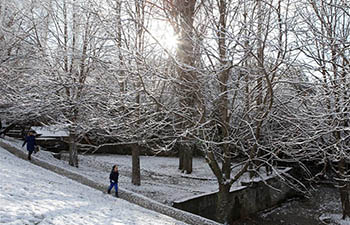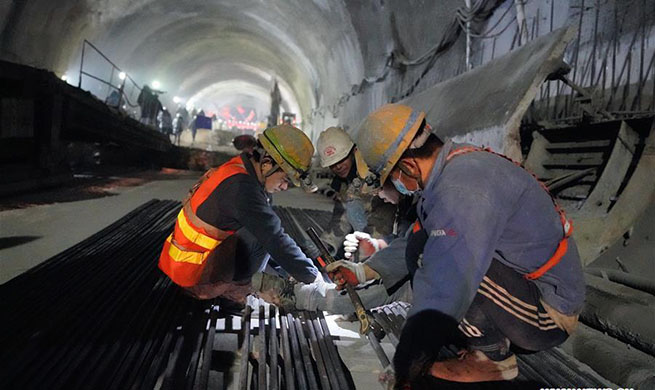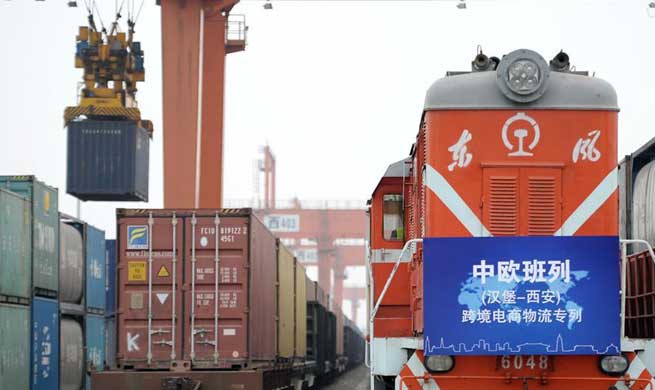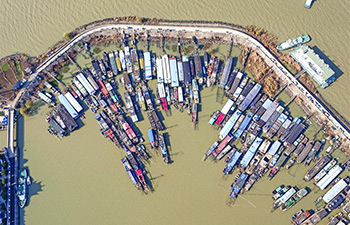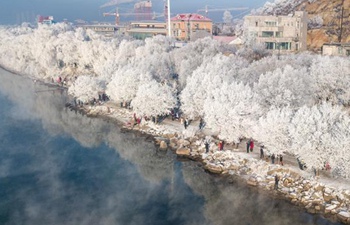TOKYO, Dec. 14 (Xinhua) -- Japan's central government on Friday began offshore landfill work for the relocation of a controversial U.S. military base in Okinawa amid staunch protests from locals.
In the coastal Henoko region in Nago on the island, the planned location of the replacement facility for the U.S. Marine Corps Air Station Futenma, sand and soil started being dumped just before noon local time in an area spanning more than six hectares on the southern side of the landfill site.
Protestors gathered from early morning to voice their opposition to the landfill work and the building of a new base, which will eventually see 157 hectares of land reclaimed from pristine waters, and the building of a V-shaped runway.
A man in his 60s was quoted as saying the central government had lost the trust of the people of Okinawa over the base relocation issue.
A women in her 70s held a placard stating that the will of the (Okinawa) people should not be ignored. A placard held by another lady also in her 70s read: "No more U.S. bases. Americans go home!"
Okinawa Governor Denny Tamaki, who held last-ditch talks with Chief Cabinet Secretary Yoshihide Suga and Defense Minister Takeshi Iwaya a day earlier in a bid to halt the landfill work, told reporters Friday that "I cannot help feeling strong resentment toward the work being carried out in defiance of the prefectural residents' will."
Tamaki, a staunch opponent of the central government's plans to relocate the base under a pact made with Washington in 1996, said the central government maintaining such a forceful position on the issue would lead the Okinawan people to "voice their anger even stronger."
Anti-U.S. sentiments were stoked on the tiny island by the rape in 1995 of an elementary school girl by three U.S. servicemen.
Tamaki was elected as governor in September's gubernatorial election on a platform of opposing the base's relocation and lessening Okinawa's base-hosting burdens and has since been pushing to resolve the issue through dialogue with the central government.
The central government, however, despite Tamaki's push for face-to-face talks, has forged ahead unilaterally with land reclamation work necessary to build the new base after the land ministry issued an injunction to suspend Okinawa revoking a permit for the landfill work.
The Okinawa prefectural government's appeal for the suspension of work for the relocation of the controversial base was also dismissed by a lower court with the ruling upheld by the Naha branch of the Fukuoka High Court on Dec. 5.
Okinawa hosts the bulk of U.S. military facilities in Japan, yet the tiny sub-tropical island accounts for just a small fraction of Japan's total landmass.
As well as shouldering the majority of U.S. bases and being victims of U.S. base-linked workers' criminal activities, which span rape and murder, to driving under the influence of alcohol, as well as a flow of accidents and mishaps involving U.S. military aircraft, the new location for the base has an extremely delicate ecosystem unique to Okinawa that the locals desperately want to protect.
Tamaki had previously said that the central government's persistent push to continue with the landfill work is completely unacceptable and against the will of Okinawans who wish to see the base moved outside of Okinawa and Japan altogether.
The prefectural government is urging the people of Okinawa to make their voices heard nationally and internationally by calling a referendum on the issue next year.
